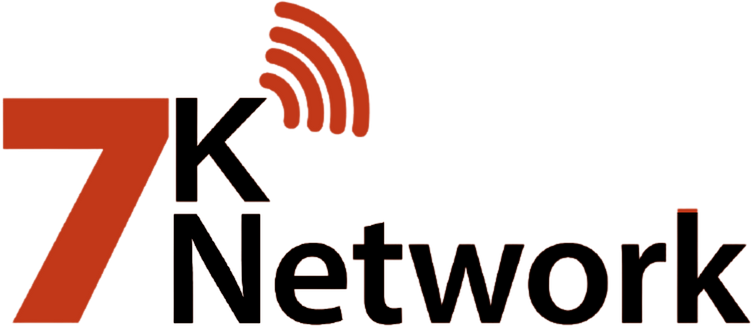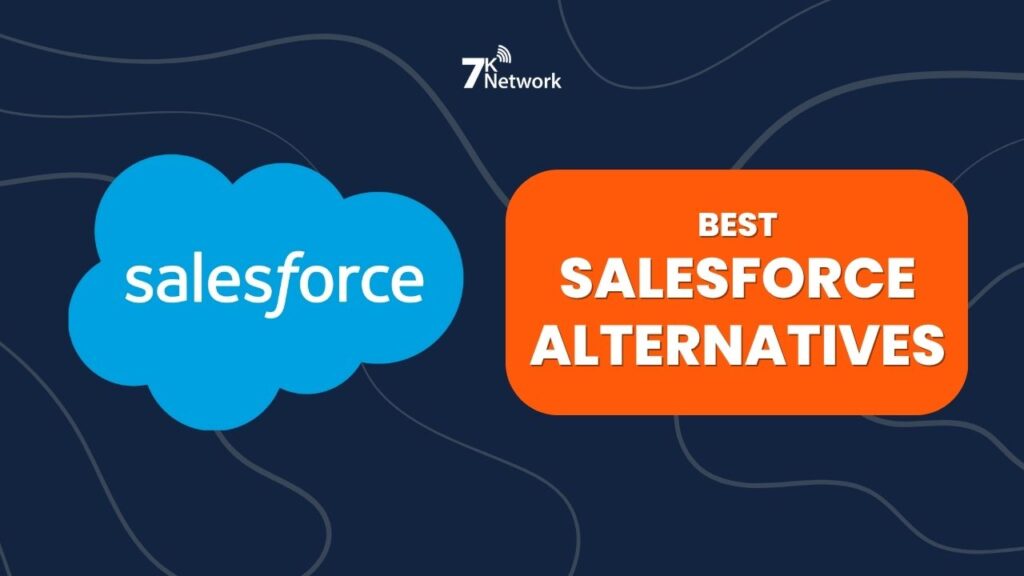The top CRM platform, Salesforce, does not always meet the unique requirements of every business, nor accommodate all their financial constraints or systems operations. Businesses requiring adaptable, as well as budget-friendly, specialized programs must examine options other than Salesforce. The tools provide solutions for different user groups, which include software developers who want custom systems, while also supporting marketers with uninterrupted campaign execution and sales groups focused on tracking leads and small businesses requiring straightforward CRMs.
The compilation of these 15 Salesforce alternatives involves an analysis of usability alongside pricing, scalability features, integration possibilities, and user reviews. The listed alternatives provide powerful solutions that serve users who seek better automation, improved collaboration, or industry-specific choices for driving growth alongside operational streamlining.
What is Salesforce?
The cloud platform named Salesforce delivers a CRM system that consolidates sales management with customer support and marketing, and analytics functions. The platform provides multiple tools that enable users to monitor customer engagement while simultaneously letting them streamline operations through automated processes, lead administration, and deliver insights by employing analytical capabilities. Salesforce stands out as a cloud-based CRM solution that enables companies of different sizes to achieve better customer relationships and generate more revenue.
Salesforce Einstein provides predictive analytics alongside automation capabilities, and users can integrate their tools through the AppExchange marketplace. The retail industry, together with healthcare and finance, uses tailored solutions through Salesforce as its preferred CRM platform. Salesforce stands as a top CRM solution thanks to its extensive environment and mobile and desktop application capabilities for business growth.
Criteria to Choose an Ideal Salesforce Alternative
1. Feature Set: To choose an ideal platform, users need to identify crucial CRM features that cover lead management, sales pipeline tracking, marketing automation, and customer support capabilities.
2. Ease of Use: A user-friendly platform design with low entry barriers will make the system suitable for teams ranging from novice to advanced technical operators.
3. Customization: Business processes require a tool that allows customization options to include customized fields together with workflows and integration capability.
4. Pricing and Scalability: The pricing should suit your budget needs while the tool maintains scalability during business enlargement. The selection of flexible plans between startups and enterprises represents an ideal situation.
5. Integration Capabilities: You should verify that the tool connects properly with existing platforms, including email platforms, marketing software, e-commerce solutions, and third-party applications.
6. Support and Community: The reliable customer support, along with detailed documentation and an active user community, serve as major determinants for effective troubleshooting and learning.
7. Performance and Reliability: The software needs to operate at a high level of speed while maintaining reliability across large amounts without experiencing performance problems.
8. Mobile Access: The CRM system must include mobile-friendly applications that enable users to manage customer relationships from their mobile devices.
9. User Reviews and Reputation: The assessment of user reviews should help establish reliability, together with user satisfaction and vendor experience.
Comparison Between Salesforce Alternatives
Here is a table comparing features, pricing, use cases, and websites for 15 Salesforce alternatives:
| CRM Tool | Key Features | Pricing (Starting) | Use Cases | Website |
| HubSpot CRM | Contact management, email tracking, live chat, sales pipeline | Free, Paid plans from $50/mo | Small to mid-sized businesses | hubspot.com |
| Zoho CRM | Team collaboration, sales automation, and project management | Free, Paid plans from $14/mo | Small to enterprise-level organizations | zoho.com |
| Pipedrive | AI-powered analytics, workflow automation, and multichannel communication | $14.90/user/mo | Small to mid-sized sales teams | pipedrive.com |
| Microsoft Dynamics 365 | Sales insights, AI-driven recommendations, integration with Microsoft tools | $65/user/mo | Enterprises and Microsoft users | microsoft.com/dynamics365 |
| Freshsales | Deal tracking, customizable pipelines, and automation | Free, Paid plans from $15/mo | Small to mid-sized businesses | freshworks.com/crm |
| Insightly | Project management, pipeline tracking, workflow automation | Free, Paid plans from $29/mo | Service-based businesses | insightly.com |
| SugarCRM | Predictive analytics, campaign management, workflow automation | $49/user/mo | Enterprises and complex sales processes | sugarcrm.com |
| Nimble | Lead scoring, built-in phone, email tracking, and AI-based insights | $24.90/user/mo | Small businesses and social media users | nimble.com |
| Copper CRM | Contact enrichment, social media integration, and relationship tracking | $29/user/mo | Google Workspace users | copper.com |
| Agile CRM | G Suite integration, pipeline tracking, and contact management | Free, Paid plans from $8.99/user/mo | Startups and SMBs | agilecrm.com |
| Keap (Infusionsoft) | Sales automation, email campaigns, and marketing automation | $129/mo | Small businesses and solopreneurs | Business process automation, sales forecasting, and marketing tools |
| Close CRM | Built-in calling, email sequences, SMS automation | $25/user/mo | Sales-driven teams and startups | close.com |
| Pipeliner CRM | Visual pipelines, customizable dashboards, mobile app | $65/user/mo | Email marketing, client management, and automation | pipelinersales.com |
| Bitrix24 | Team collaboration, sales automation, project management | Free, Paid plans from $49/mo | Sales teams need visual tools | bitrix24.com |
| Creatio | SMBs and teams need all-in-one tools | $25/user/mo | Enterprises with custom workflows | creatio.com |
List of 15 Salesforce Alternatives
1. HubSpot CRM
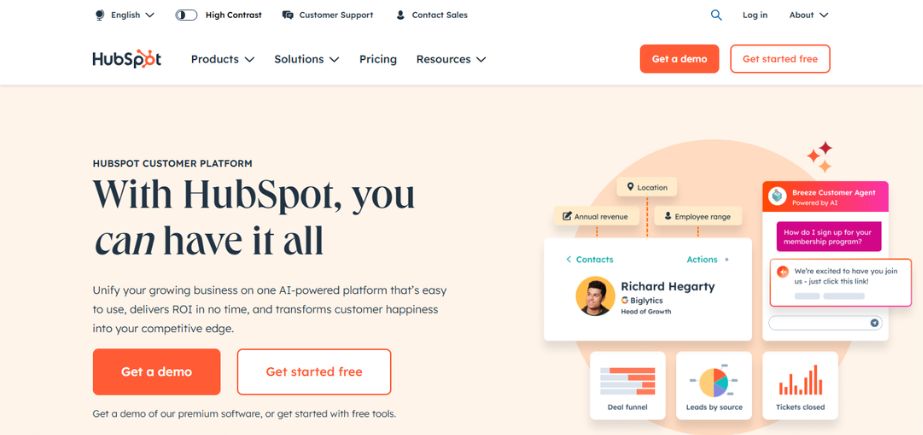
Users can access free HubSpot CRM, which provides a basic Customer Relationship Management solution together with user-friendly features to handle contacts and automate sales activities while tracking performance information. This tool combines perfectly with all HubSpot marketing and service solutions to create a complete business management system. Small operations and emerging startups will find HubSpot CRM highly suitable for developing customer relationships because of its simple design and strong reporting ability.
Key Features
- Contact and lead management.
- Email tracking and notifications.
- Sales pipeline management.
- Integrates with HubSpot marketing and service tools.
- Customizable reports and dashboards.
Pros
- Free to use with essential features.
- Intuitive and easy-to-navigate interface.
- Robust marketing and sales automation.
Cons
- Limited features on the free plan.
- Some advanced features are paid.
Pricing
Free plan available; paid plans start at $45/month.
Who Should Use It?
Small businesses, startups, and companies looking for an easy-to-use CRM with strong integrations.
2. Zoho CRM
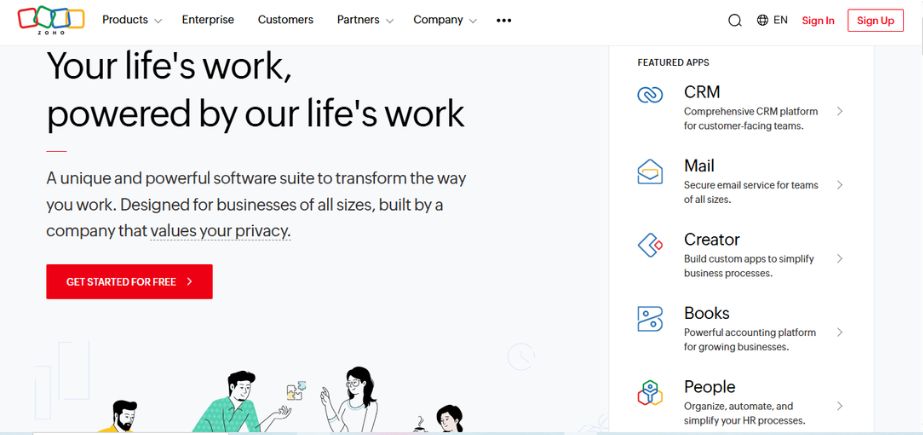
Zoho CRM delivers an inexpensive solution featuring adaptable functions as well as extensive lead and contact management features with sales automation and analytics capabilities. Through its strong connection with 40 or more third-party apps Zoho CRM lets users achieve flexible interoperability. Corporations of every scale can effectively use Zoho because it exhibits strong scalability potential. Users from industries with particular workflow needs can use Zoho CRM easily while benefiting from its extensive customization abilities however it presents initial difficulty for novices to learn.
Key Features
- Lead and contact management.
- Workflow automation and task management.
- Sales forecasting and analytics.
- Customizable reports and dashboards.
- Integration with Zoho and third-party apps.
Pros
- Affordable pricing with a free plan.
- Highly customizable with workflow automation.
- Scalable for businesses of all sizes.
Cons
- Steeper learning curve for new users.
- Limited integrations on lower-tier plans.
Pricing
Free plan available; paid plans start at $14/user/month.
Who Should Use It?
Small to medium-sized businesses looking for an affordable, scalable, and customizable CRM solution.
3. Pipedrive
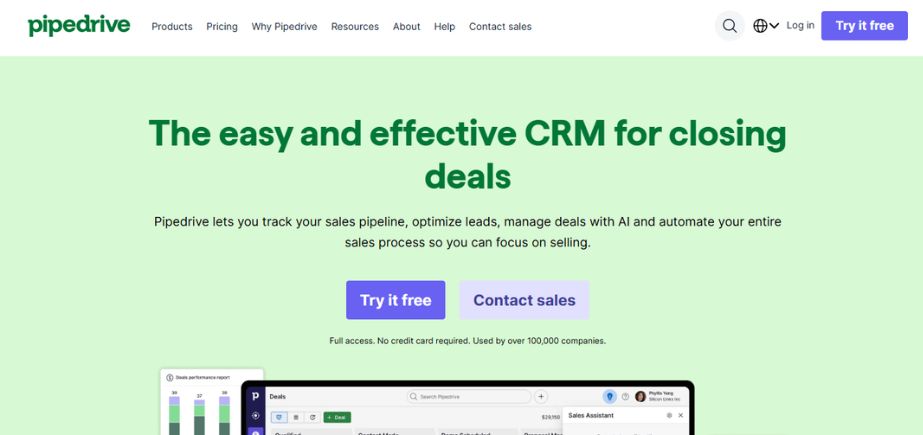
Pipedrive is a CRM tool that focuses on selling through its visual pipeline management system with a user-friendly design. Pipedrive lets sales teams monitor leads while managing sales opportunities along with producing performance predictions. The system automates recurrent activities which lets teams dedicate their efforts toward finishing deals. Sales teams find Pipedrive to be ideal but businesses requiring integrated sales and marketing solutions will probably need additional features beyond what the platform offers.
Key Features
- Visual sales pipeline.
- Email integration and tracking.
- Workflow automation.
- Sales forecasting and reporting.
- Integrates with popular apps and tools.
Pros
- Easy to use and intuitive interface.
- Visual pipeline helps manage leads effectively.
- Great for sales teams focusing on performance tracking.
Cons
- Limited marketing automation features.
- Reporting can be basic compared to other tools.
Pricing
Plans start at $14.90/user/month.
Who Should Use It?
Sales teams looking for a simple, sales-focused CRM with strong pipeline management tools.
4. Microsoft Dynamics 365
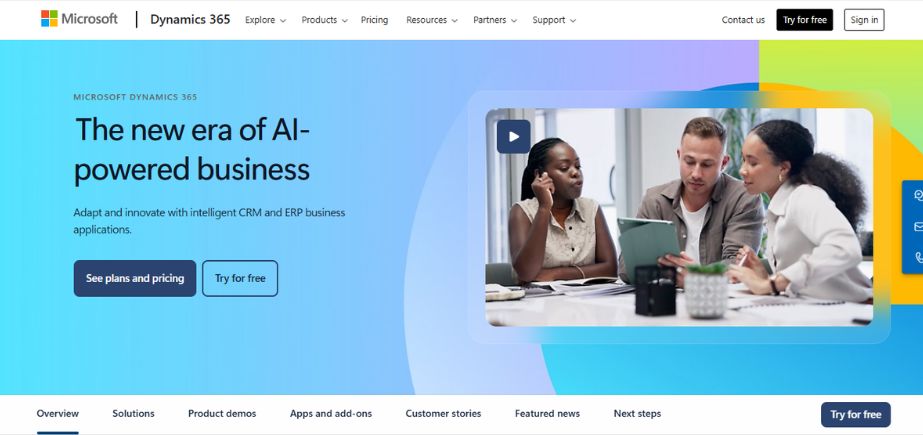
Small enterprises needing both customer relationship management and enterprise resource planning applications should use Dynamics 365 by Microsoft. The platform delivers AI analytics together with automated sales functions and customer support handling tools. The platform works smoothly with Microsoft tools to establish a productive workspace that promotes collaboration between users. Its complex system along with expensive costs makes Microsoft Dynamics 365 harder to use for smaller companies that need straightforward customer relationship management features.
Key Features
- Sales, marketing, and customer service modules.
- Advanced AI-powered analytics.
- Customizable workflows and reporting.
- Integration with Microsoft tools (e.g., Outlook, Office 365).
- Omnichannel support for customer engagement.
Pros
- Powerful and customizable features.
- Seamless integration with Microsoft ecosystem.
- Suitable for large enterprises.
Cons
- Complex to implement and use.
- Higher cost compared to other CRMs.
Pricing
Pricing on request.
Who Should Use It?
Large enterprises and businesses already using Microsoft tools, requiring a highly customizable CRM and ERP solution.
5. Freshsales
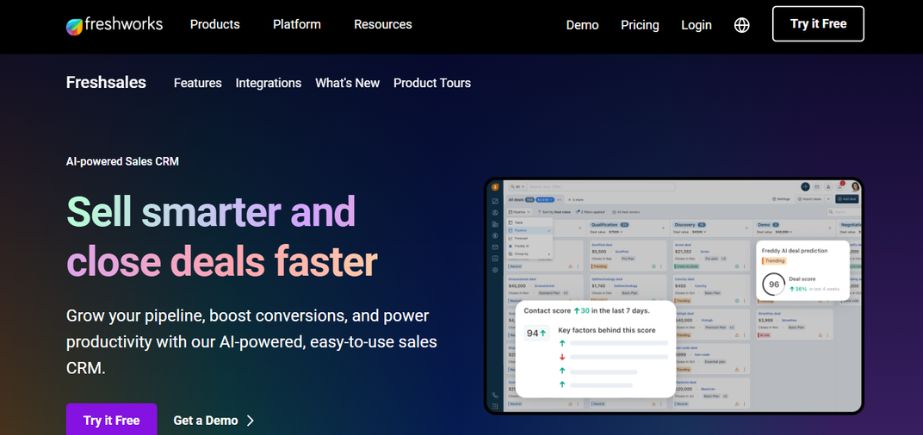
Freshworks produces Freshsales as a CRM system dedicated to sales automation with an intuitive design. Freshsales by Freshworks enables users to manage their leads through its automation tools, track emails and generate AI-generated insights, as well as display sales pipeline information visually. The system works well for businesses of all sizes, from small and mid-sized, because its interface is easy to use and its integrations are robust. Users recognize Freshsales as attractive because of its budget-friendly cost structure coupled with its advanced features but some people believe the reporting capabilities fall short of more advanced solutions.
Key Features
- Lead and contact management.
- Built-in email tracking and phone integrations.
- AI-powered deal insights and forecasting.
- Workflow automation and task management.
- Customizable reports and dashboards.
Pros
- User-friendly with an intuitive interface.
- Affordable pricing with a free plan.
- Advanced AI insights for sales.
Cons
- Limited integrations on the lower-tier plans.
- Reporting features can be improved.
Pricing
Free plan available; paid plans start at $15/user/month.
Who Should Use It?
Small to mid-sized businesses looking for an affordable CRM with advanced sales features.
6. Insightly
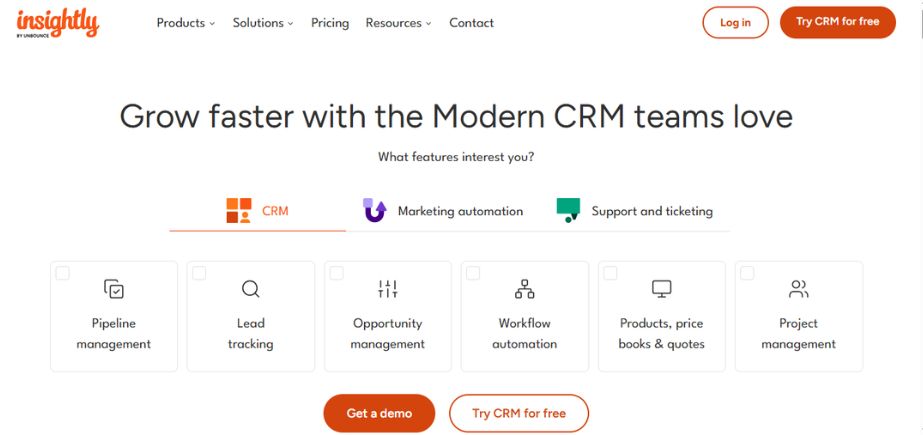
Insightly provides users with a CRM system that features integrated project management services. Insightly provides a single platform that enables businesses to administer their contacts among other features including projects and sales pipelines and tasks. An extensive feature of Insightly enables connection to multiple productivity applications including Gmail, Office 365, and QuickBooks. The platform suits businesses focusing on projects yet lacks complete features needed by big organizations and teams which need extensive customization alongside advanced automation systems and detailed reporting solutions.
Key Features
- Contact and project management.
- Workflow automation.
- Customizable reports and dashboards.
- Integration with Google Apps, Office 365, and third-party tools.
- Lead management and email tracking.
Pros
- Excellent for businesses with project-based sales.
- Strong integration with Google and Microsoft tools.
- Customizable interface.
Cons
- Steeper learning curve for new users.
- Limited marketing automation.
Pricing
Free plan available; paid plans start at $29/user/month.
Who Should Use It?
Businesses that need project management and CRM features combined, such as service-based businesses.
7. SugarCRM
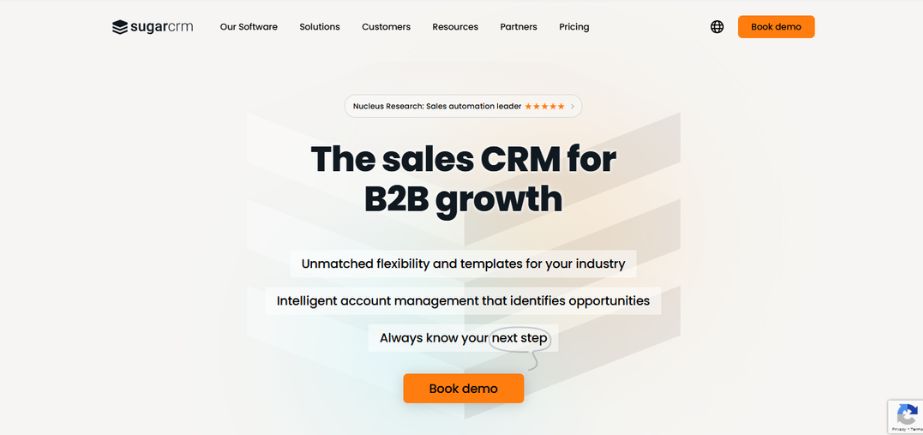
The flexible cloud-based CRM solution SugarCRM stands out because it provides users with high customization power and automatic system functions. The system provides thorough capabilities for sales management together with marketing and customer support functions. Teams have access to precise reporting and analytical features in SugarCRM that enable them to base their choices on data. Small businesses might find SugarCRM’s pricing structure along with its complex nature to be unaffordable and its elaborate features may pose difficulty for users to adapt easily.
Key Features
- Sales automation and lead management.
- Advanced reporting and analytics.
- AI-powered insights.
- Customizable workflows and dashboards.
- Integrates with popular apps and tools.
Pros
- Highly customizable to fit unique business needs.
- Strong automation features.
- Powerful reporting and analytics.
Cons
- Can be complex for smaller businesses.
- Pricing is higher compared to other CRM tools.
Pricing
Pricing available upon request.
Who Should Use It?
Mid-to-large businesses that require a customizable CRM with advanced automation and analytics capabilities.
8. Nimble
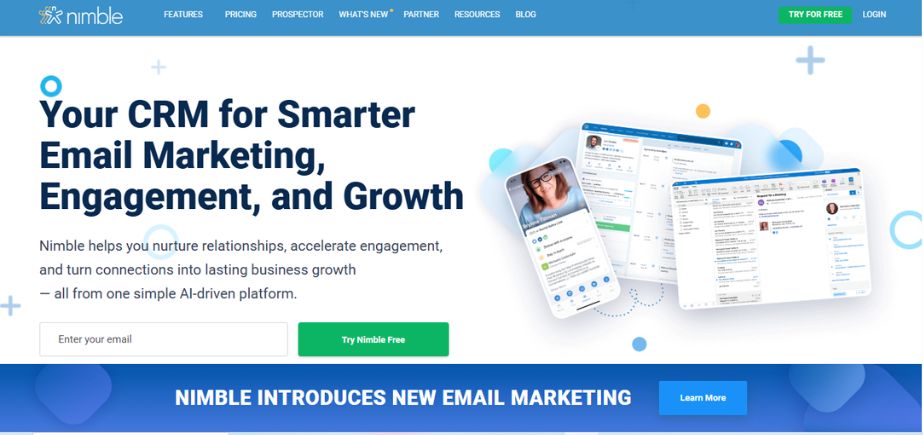
Nimble serves as a CRM platform specifically built for small businesses and professional customers and delivers smooth social media connection capabilities to facilitate customer relationships. Users can utilize Nimble to handle contact listings, monitor their social connections, and develop better connections with others. The intuitive interface of this CRM tool makes it suitable for entrepreneurs working with social media, but it doesn’t provide all sales and marketing capabilities that other CRM systems contain.
Key Features
- Social media integrations (LinkedIn, Twitter, Facebook).
- Contact management and email tracking.
- Task and calendar management.
- Simple and clean interface.
- Integration with third-party apps.
Pros
- Great for businesses that rely on social media for sales.
- Affordable pricing with a focus on simplicity.
- Easy-to-use interface.
Cons
- Limited advanced features for larger teams.
- Not as customizable as other CRMs.
Pricing
$19/user/month.
Who Should Use It?
Small businesses and professionals who rely heavily on social media for customer engagement.
9. Copper CRM

The deep integration between Copper CRM and Google Workspace gives businesses an advanced system to handle customer relationships and monitor sales activities. Copper CRM provides an excellent solution for teams using Google tools because of its automatic features alongside customizable workflows and advanced reporting functionalities. Small companies along with organizations that want economical and straightforward customer relationship management solutions may face obstacles due to the premium cost of Copper CRM.
Key Features
- Deep integration with Google Workspace.
- Task and project management.
- AI-powered insights and predictive analytics.
- Sales automation and pipeline management.
- Customizable reports and dashboards.
Pros
- Excellent integration with Google Workspace tools.
- AI-powered insights to improve sales.
- Great for teams already using Google tools.
Cons
- Expensive compared to other CRM solutions.
- Not as feature-rich for large enterprises.
Pricing
Starts at $25/user/month.
Who Should Use It?
Small to mid-sized businesses already using Google Workspace and seeking seamless CRM integration.
10. Agile CRM
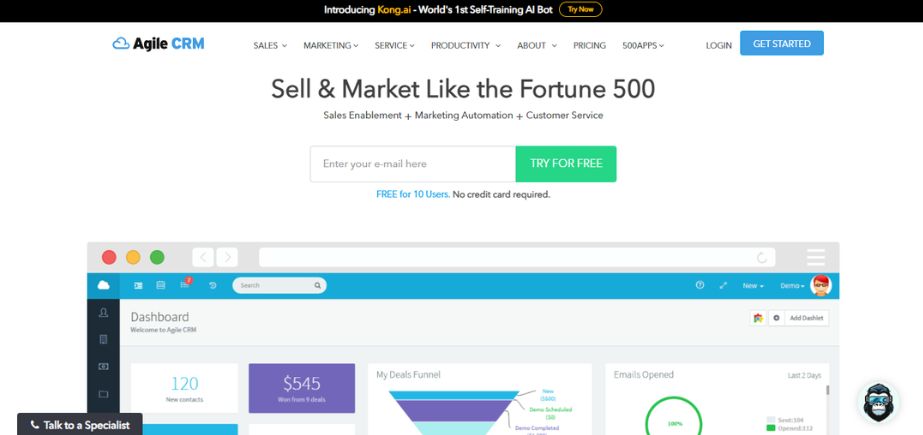
The low-cost user-friendly solution available through Agile CRM serves the needs of small businesses. This system provides users with tools for email campaign lead ranking automated operations and sales performance monitoring. Agile CRM provides exceptional marketing tools in a user-friendly package that helps businesses achieve effective, low-priced CRM operations. Users experience limitations with advanced features and customization capabilities that advanced CRMs freely provide.
Key Features
- Contact management and sales tracking.
- Email marketing and automation.
- Task management and reporting.
- Integration with popular tools like Shopify, Zapier, and Gmail.
- Affordable pricing with a free plan.
Pros
- User-friendly interface.
- Affordable pricing with a solid free plan.
- Strong marketing automation features.
Cons
- Limited customization options.
- Reporting and analytics can be basic.
Pricing
Free plan available; paid plans start at $8.99/user/month.
Who Should Use It?
Small businesses and startups that need an affordable CRM with strong sales and marketing automation features.
11. Keap (formerly Infusionsoft)
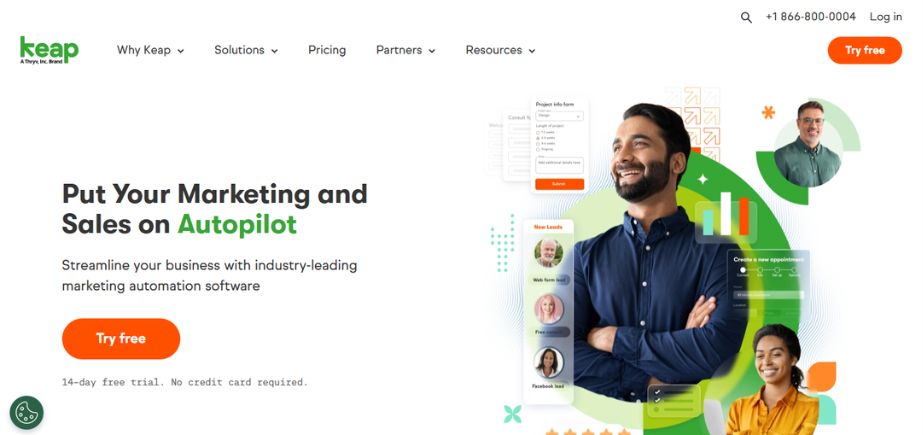
Keap stands as an automation solution specialized for marketing and customer relationship management purposes targeting small business operators. Keap features lead capture features together with sales pipeline management functionality email marketing tools and e-commerce functions. Keap serves modern businesses by automating their marketing operations which enhances their operational effectiveness. Smaller operations with limited funding and entry-level staff might find Keap too expensive while facing obstacles when setting it up.
Key Features
- Sales pipeline management.
- Marketing automation and email marketing.
- Lead scoring and tracking.
- E-commerce integration and payment processing.
- Customizable reporting and analytics.
Pros
- Strong marketing automation tools.
- Comprehensive sales pipeline management.
- Great for small businesses focused on automation.
Cons
- Higher pricing for small businesses.
- Somewhat complex setup and learning curve.
Pricing
Starting at $79/month.
Who Should Use It?
Small businesses and entrepreneurs who need both CRM and marketing automation to scale their operations.
12. Close CRM
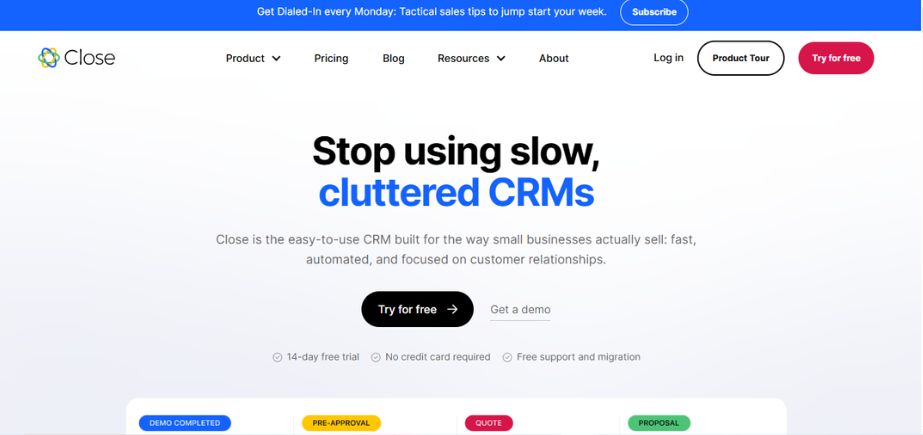
The primary function of Close CRM is to provide simplified tools for communication and task management to sales teams. The solution blends communication capabilities with task management features inside one platform featuring robust pipeline automation features. The sales-focused platform Close CRM enables efficient tracking and deal closing within their system however the absence of marketing capabilities reduces its potential to serve businesses seeking all-inclusive CRM functionality.
Key Features
- Built-in calling and email features.
- Task and lead management.
- Reporting and sales forecasting.
- Workflow automation for increased efficiency.
- Integration with third-party tools.
Pros
- Strong focus on sales automation.
- Great communication tools like calling and emailing.
- Helps sales teams stay organized and efficient.
Cons
- Higher pricing than many alternatives.
- Limited marketing features.
Pricing
Plans start at $29/user/month.
Who Should Use It?
Sales teams and businesses that need a CRM that emphasizes communication and workflow automation.
13. Pipeliner CRM
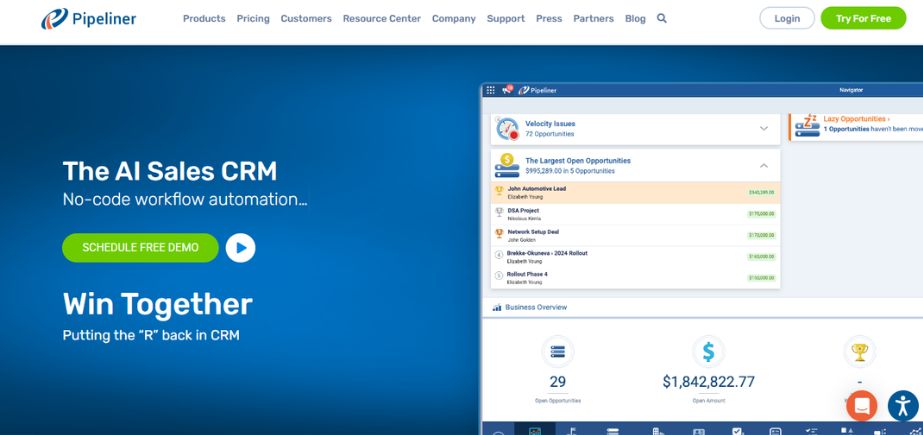
Pipeliner CRM presents an attractive graphical interface through its sales pipeline to enable lead management and tracking for sales teams. The simple business workflows that Pipeliner provides come from its ability to set sales procedures and automate tasks while offering advanced analytics capabilities. Although targeting sales performance the system falls short as a comprehensive CRM solution because it lacks enough marketing functionality for businesses requiring a complete platform.
Key Features
- Visual sales pipeline.
- Contact management and lead scoring.
- Advanced sales analytics and reporting.
- Customizable sales processes.
- Integration with third-party tools.
Pros
- User-friendly and intuitive interface.
- Powerful sales analytics and reporting.
- Flexible and customizable sales processes.
Cons
- Limited marketing automation.
- Can be expensive for small teams.
Pricing
Starts at $25/user/month.
Who Should Use It?
Sales-focused teams and businesses looking for a visual, customizable CRM to enhance sales processes.
14. Bitrix24
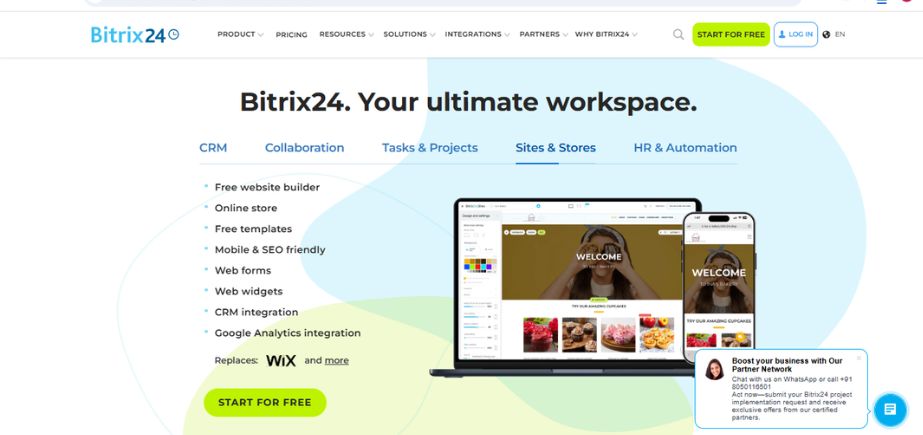
Smaller businesses with medium-sized operations can leverage Bitrix24 because it functions as a complete CRM solution with collaborative features. Bitrix24 provides multiple tools for contact management in addition to sales automation tools, project management features and internal communication capabilities. Many features provided by the free plan make it overwhelming because of its extensive list of capabilities. Advanced setup configurations together with customizable features create obstacles for new users working with CRM systems.
Key Features
- Contact and lead management.
- Sales pipeline automation.
- Task and project management.
- Communication tools like video calls and chat.
- Integration with third-party apps.
Pros
- Free plan with essential features.
- All-in-one solution with CRM and project management.
- Strong communication and collaboration tools.
Cons
- Complex for beginners.
- Limited customization on free plans.
Pricing
Free plan available; paid plans start at $19/user/month.
Who Should Use It?
Businesses looking for an all-in-one platform that integrates CRM with project management and communication tools.
15. Creatio
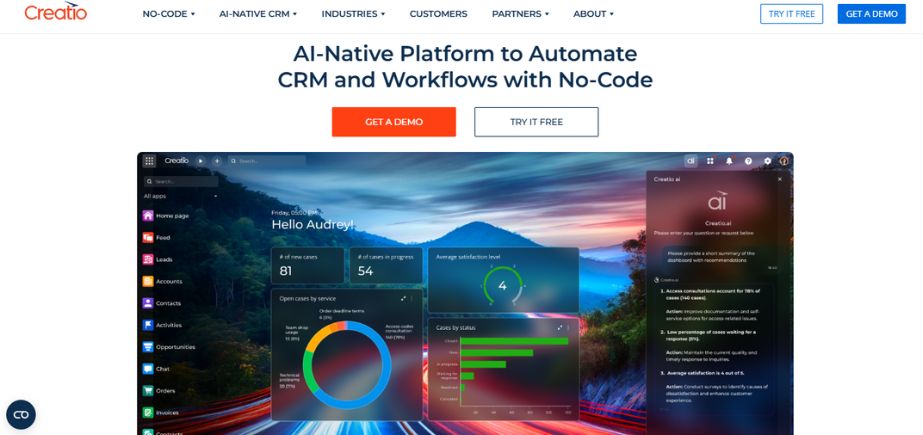
The Creatio platform serves as a CRM solution with process automation features because it brings adjustable tools that help businesses handle their customer relationships. Creatio provides strong capabilities for sales, marketing and customer service through its automated and customizable platform features. The platform lets businesses adjust solutions to specific needs but its advanced features along with its higher price point might not suit small organizations and novice CRM users.
Key Features
- Sales automation and lead management.
- Marketing automation and email campaigns.
- Service management and customer support.
- Low-code platform for customization.
- Integration with various apps and systems.
Pros
- Highly customizable with low-code options.
- Strong automation features.
- Excellent customer service tools.
Cons
- Can be complex for small businesses.
- Pricing may be high for smaller teams.
Pricing
Custom pricing.
Who Should Use It?
Mid to large businesses requiring a highly customizable and automated CRM solution.
Conclusion
Your decision to select a top Salesforce replacement depends on the specific business requirements that match your financial capabilities. Small enterprises alongside startups should consider HubSpot CRM because this platform provides free software that enables simple customer engagement management. Enterprises requiring comprehensive customizability along with scalability should select between Microsoft Dynamics 365 and Zoho CRM because of their advanced functionalities and integration options.
Freshsales delivers budget-friendly CRM software that maintains all required functionalities. Businesses interested in marketing automation should consider ActiveCampaign but Pipedrive provides the best features to sales teams. Organizational priorities must guide your CRM choice since you need to choose a system that matches your established objectives such as pricing, features or usability preferences.
FAQs
1. What are the best alternatives to Salesforce for small businesses?
Good alternatives for small businesses are HubSpot CRM and Freshsales. They offer free or cheap plans with simple interfaces and important features that help small businesses manage their customer relationships well.
2. Which alternative to Salesforce is the best for enterprises?
Excellent choices for an enterprise would be Microsoft Dynamics 365 and Zoho CRM, offering the ability to have a deep customization level, scalability, and integration that could handle more complex business requirements.
3. Is there any free version of Salesforce?
Yes, there is HubSpot CRM which has a fully-fledged free version with basic CRM functionality and Zoho CRM, which has a free edition for three users. These are great solutions for a start-up or a business with limited resources.
4. Which is best for the sales teams?
Pipedrive is the right choice for those teams who have a sales orientation and manage the pipeline, deals, and also automate processes relevant to sales processes.
5. Which is best for marketing automation?
ActiveCampaign is the right choice for business houses with a focus on marketing automation. There is a balance of CRM functionality and deep automation for email marketing, lead nurturing, and campaign management.
